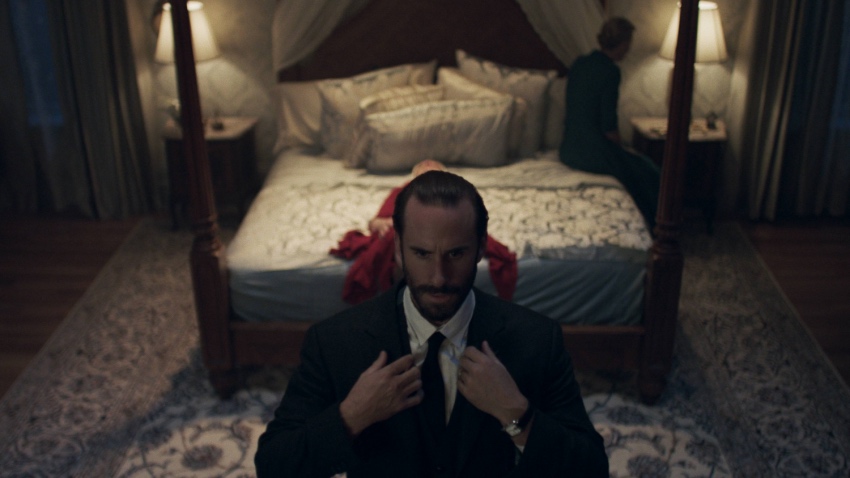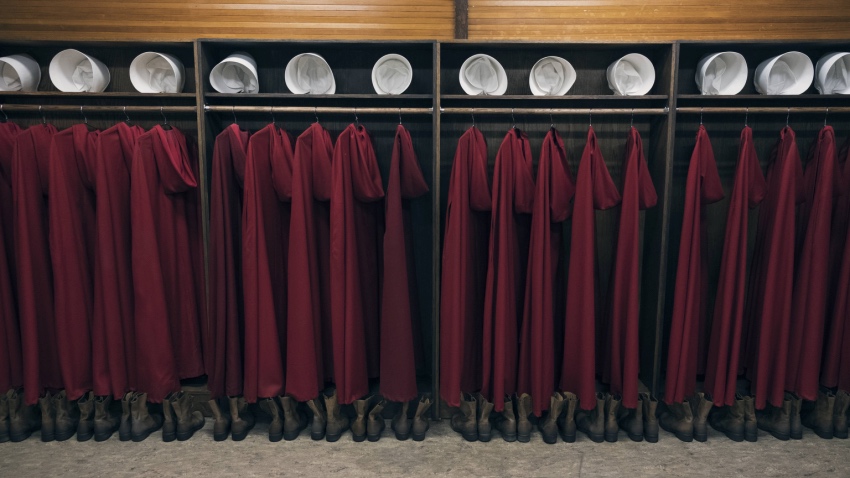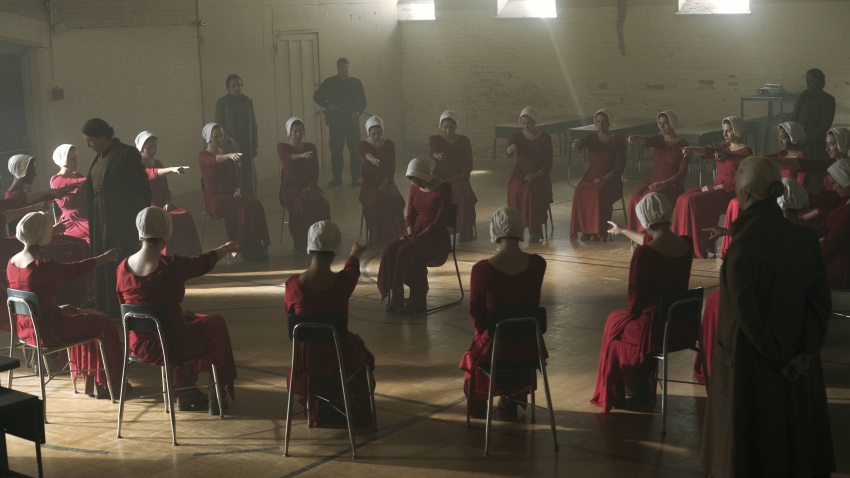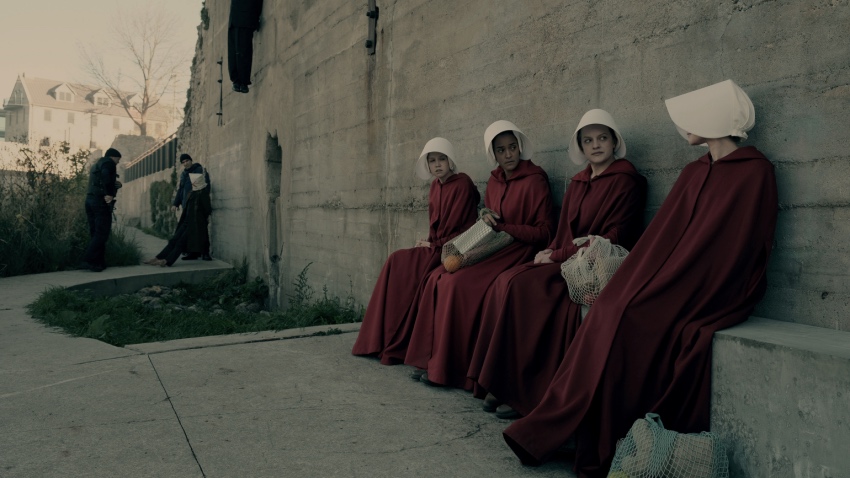All Photos Courtesy Hulu
On Thursday, the US House of Representatives passed their version of the American Health Care Act, a bill to replace Obamacare with something that, among many other things, cracks down on women’s health and safety. There was one phrase that resonated a lot that day: “This sounds just like The Handmaid’s Tale.”
Should AHCA become law, it will defund Planned Parenthood for one year unless it stops offering abortions, as well as make sexual assault, domestic violence, and pregnancy pre-existing conditions for states that set up high-risk insurance pools (Note: the details about this are complicated, as many states already have protections for some of these conditions, you can find a detailed breakdown here). This is quite literally the government financially punishing sexual assault and DV victims, which are disproportionately women, and forcing women who become pregnant (possibly without access to abortion services) to face hiked premiums for the rest of their lives.
This is just one of the many ways women today feel like we’re already living in a version of The Handmaid’s Tale. Sixty-one-year-old Desiree Fairooz faces a year in prison after being convicted of a crime for laughing at Attorney General Jeff Sessions during his confirmation hearing, yet convicted sexual assaulter Brock Turner got six months… and only served half of them. Taking photos up women’s skirts is perfectly legal in some states. Public schools in some states only teach abstinence until marriage, going so far as to encourage teens to sign virginity pledges. This doesn’t even begin to go into the laws and rules that punish the LGBTQ community.*
The Handmaid’s Tale, a book by Margaret Atwood that’s currently one of Hulu’s highest-rated shows, is about a dystopian society in what used to be America, where women’s rights have been stripped away by a religious oligarchy. These include not letting women hold jobs, have their own bank accounts, or control their own bodies. It’s an extreme example of something that’s echoed in former and current policies in the United States. Let’s not forget it’s been less than a century since women could legally vote here.
Some of the most recent issues might seem hypothetical — after all, AHCA still has to pass the Senate, and President Donald Trump’s executive order on religious freedom was so meaningless the ACLU retracted its promise to sue. However, there are already a bunch of American laws that target women and sexuality. Some of them are old and practically deserted, others have been passed recently, and a few of them are vague interpretations of existing laws to restrict women’s rights. All of them share one thing in common: They’re real, they’re shitty, and they’re straight out of The Handmaid’s Tale handbook.
1) Jail time for living together before marriage

In The Handmaid’s Tale, couples weren’t legitimate unless they were married — Gilead’s government went so far as to invalidate all second marriages as adultery. In the US, there are still two states where it’s illegal to live with someone before you’re married. In both states, it’s more than a slap on the wrist… you can actually go to jail. Under Mississippi law, if a man and woman are proven to be living together and having “habitual sexual intercourse,” they can be fined up to $US500 ($674) each and sentenced to six months in jail. In Michigan, a state that’s trying to overturn the law, you can get up to a year.
The laws are rarely enforced, but it’s one of those situations where, since the law exists, they could be used to punish couples at anytime — Michigan’s was cited in 2005 to deny a father visitation rights, since he was living with another woman. Even if that were to never happen, having a law that criminalizes cohabitation (especially same-sex couples, since they couldn’t get married until recently) sends a really bad message — that their state considers their actions a “crime against public morals and decency.”
2) Requiring fetuses get funerals (and other anti-abortion regulations)

The court ruling for Roe v. Wade in 1973 ensured that millions of American women had the right to pursue safe and legal abortions. Some conservative groups and lobbies have spent years trying to backtrack this landmark decision. Honestly, they are too many to count, including letting husbands sue to block abortions, or forcibly closing Planned Parenthoods because the hallways were too narrow. One of them comes out of Indiana, signed by none other than current Vice President Mike Pence.
Last year, Pence (as governor) signed a law “with a prayer” that demanded all aborted or miscarried fetuses get buried or cremated — which has been criticised for doing nothing except mentally torturing the women affected. The law is now shared with Texas and Louisiana, though they have had trouble enacting it thanks to hold-ups in court. Indiana is also the second state in the country to ban abortion in cases where a fetal birth defect was discovered. Some states, like Arizona, even let doctors lie to a woman if a defect is found to reduce the risk of her wanting an abortion. (Side note: Under the new AHCA, if that birth defect was any of these conditions, the baby would have a pre-existing condition, meaning they could face a lifetime of higher insurance premiums.)
But that’s not enough, apparently. In January, Indiana representative Curt Nisly filed an outright “Protection at Conception” bill that would make all abortions illegal, leaving criminal charges up to county prosecutors. This isn’t anything new — these bills often get filed to appease groups or lobbyists. But, there’s one big difference now… Roe v. Wade is in danger.
3) Roe v. Wade “trigger laws”

During his debates and limited time as president, Trump has promised to appoint judges who would overturn Roe v. Wade, returning full control over abortion access to the states. Some states, like California and Hawaii, already have laws that protect a woman’s right to an abortion. Others have the exact opposite. At least six states in the US have so-called “trigger laws,” which are laws on standby to make abortion illegal in the state as soon as Roe v. Wade is overturned (technically they signal the state’s “intention,” but opponents say they could be enacted quickly if not immediately).
These include states like Arkansas, Kansas, and Missouri. One of the most notable cases right now is Illinois, whose legislature has been trying to pass a bill that would remove the state’s own trigger law, as well as remove provisions that deny insurance coverage of abortion to women on Medicaid and state employee insurance. Illinois governor Bruce Rauner has pledged to veto the bill.
4) Making vibrators and sex toys illegal

In a few states, like Alabama and Georgia, it’s still illegal to buy sex toys. These bans mainly target vibrators and dildos, which are often used by women for sexual stimulation — almost half of women use sex toys nowadays, and a 2009 survey showed that three out of four women have trouble climaxing during sex without extra stimulation, like from a vibrator.
Alabama’s ban targets all toys that are “primarily for the stimulation of human genital organs,” in order to preserve public morality. In Georgia, specifically, you’re only allowed to buy a sex toy if it’s needed medically or educationally, or for legislative or law enforcement purposes. Until 2008, Texas had a similar ban — one that Senator Ted Cruz fought to protect on the grounds that sex was solely for reproductive purposes (much like The Ceremony in Handmaid’s Tale). The law actually led to a 43-year-old mother getting arrested in 2003 after she sold a sex toy to an undercover police officer.
5) Denying permanent birth control based on age, number of kids

Some women in Kentucky have reported that doctors turned them away for wanting to get their tubes tied, or tubal ligation, if they were younger than 25 years old, unless they already had at least three kids. This is a response shared across several states, like Illinois and Colorado, where women are routinely denied permanent birth control. Men typically aren’t denied as much, but in Catholic hospitals, both tubal ligations and vasectomies are usually refused on religious grounds.
Until the 1970s, women legally needed their husband’s permission to get tubal ligation, but that was challenged and overturned. Nowadays, doctors cannot refuse patients based on federally protected grounds, like race, religion, or gender (though trans patients in some states risk rejection). Otherwise, the law is on their side, and doctors are free to refuse services for any number of personal reasons. The official excuse given for denying tubal ligation is that doctors don’t want to be sued by women who later regret permanent birth control, but most women who are refused the service say it’s because the doctor insists they will probably want children later… or should leave the option open, even if they have no intention of having kids.
6) Getting fired for sexually arousing their bosses

There isn’t a law that specifically says a woman can get canned if she unintentionally ignites her boss’s nether regions, but several justices in Iowa used the law to justify one woman’s firing a few years ago. In 2010, a dental assistant filed a gender discrimination lawsuit against her former boss, who fired her because he was attracted to her. He reportedly told her he’d get erections if her outfit was too revealing, even though she mostly wore scrubs and a T-shirt. She also said she never reciprocated his advances.
Iowa is an “at-will state,” meaning employees can be fired at any time for any reason, so long as it’s not based on a federally protected reason, like race, religion, age, or gender. Unfortunately, the male judge thought gender wasn’t an issue when it came to a case about sexual attraction, and dismissed it on the grounds that the boss was simply trying to protect his marriage. Two years later, the all-male Iowa Supreme Court came to the same conclusion during Melissa Nelson’s appeal, adding it was ok to fire her “simply because the boss views the employee as an irresistible attraction.” The Handmaid’s Tale featured all women being laid off to protect themselves and men. Whether we like it or not, this case set a legal precedent that a boss’s sexual urges can lead to women losing their jobs.
7) Forced parental rights for rapists

One of the biggest conflicts in The Handmaid’s Tale, at least for some of the handmaids, is how their commanders (who are glorified rapists) get to keep their children, along with their wives. Right now, women in seven states can be forced to share parental custody with their accused or convicted rapists, and efforts to repeal those laws have continued to fail. The latest example is in Maryland, where rape victims have to negotiate with their accused rapists for custody rights, and also have to get permission from them to put their children up for adoption.
In Maryland, a female delegate tried for the ninth time to get rape victims full custody rights over their children. Sadly, though not surprisingly, the all-male panel in the General Assembly ran out of time and was unable to move forward the bill that would have allowed women whose children were conceived via rape to block their rapists’ parental rights.
8) Needing a permit to wear high heels

Government-sanctioned dress codes tend to target women’s attire more than men’s — for example, a female reporter was kicked out of the Speaker’s Lobby on Thursday (right around the AHCA vote) for wearing a sleeveless dress. While it’s true that women’s professional attire has more flexibility than men’s, it also comes across as horribly paternalistic when a public school or government institution bans perfectly acceptable clothes on the grounds that women might look “indecent” to the male gaze. It’s why women in The Handmaid’s Tale were forced to dress so conservatively, to avoid calling attention to their bodies.
But that’s not the only reason women’s clothing has been restricted. Take the city of Carmel-by-the-Sea, California, where women have to get a permit from City Hall if they plan to wear high heels above two inches (if the stiletto is less than one square inch wide). The city claims it’s so they can protect themselves against lawsuits in the event that a woman falls — at least that’s been the defence since it was first created in the 1920s. In any case, a woman caught wearing heels without this free permit is technically breaking the law… even though the law rarely enforced.
9) Women can’t revoke consent for sex, even during violence

A notable scene in the first episode of Hulu’s show, as shown above, has the handmaids shun one of their own for being gang-raped, saying it was her fault she was violated. A loophole in North Carolina’s state law on sex and consent, set by a 1979 State Supreme Court case, says that it’s not considered rape if a woman agreed to sex initially, even if she later revokes her consent, even if her partner becomes violent.
The case was recently cited to reduce Jonathan Wayne Guy’s sentence from second-degree rape to a misdemeanour assault, giving him only 10 months in jail. Amy Guy, the victim who agreed to sex with her estranged husband but begged him to stop after he became violent, has pledged to try and get the law changed. There have been attempts over the years, and many lawmakers agree it should be fixed, but sadly nothing’s happened.
10) Employers can keep paying women less… if they already were doing so

On average, American women earn 80 cents ($1.08) for every dollar a man makes, and that number is even worse for women of colour. The Equal Pay Act of 1963 forbids employers from paying women less for the same amount of work, unless it’s based on seniority, merit, quantity or quality or work, or any other reason other than their gender. Of course, that “any other reason” tends to be cited quite a bit as an excuse to pay women less than men… including the fact that, in the past, women were paid less than men.
Last month, an appeals court ruled that women could legally be paid less than men based on differences in their previous salaries, overturning a previous ruling that stated women’s pay should be re-evaluated because earlier salaries are traditionally lower than men’s due to systemic gender bias. The California teacher’s lawyer said they’re still planning the next step, but he could see the case going to the US Supreme Court. Unfortunately, since Trump is bent on filling the bench with judges who think women can’t make their own healthcare decisions, it doesn’t seem likely they’d care about how much women get paid.

As Offred would say (in her head, since she’s barely allowed to speak): “It’s a fucking nightmare.”
